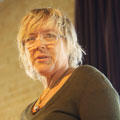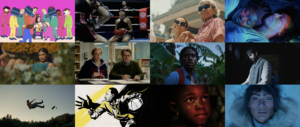Sundance Institute Indian Paintbrush Producers Award Recipients Josh Penn and Dan Janvey for Beasts of the Southern Wild. Photo by Stephen Speckman.
Eric Hynes
Though it’s never been easy to make independent films—not by a long shot—the current economic climate has only made it harder to finance, produce, and distribute the kinds of films that Sundance was created to showcase. This reality makes community-building events like Sunday’s annual Producers Luncheon all the more vital. As attendees chatted over omelettes and mimosas at The Shop—a beautiful old warehouse that normally serves as a yoga studio—Sundance Institute leaders handed out grants, introduced Fellows, and praised the work of producers—the unsung heroes of independent film.
“Today you have to be more entrepreneurial than ever, so it’s a testament to your tenacity, creativity and resourcefulness that you’re here in such a competitive year of the festival,” Keri Putnam, Executive Director the Sundance Institute, told the producers in attendance. “We really believe it is your vision, your creativity and tenacity that have made these films possible,” concurred Michelle Satter, Director of the Feature Film Program.
Keynote speaker Sarah Green, who produced two of 2011’s most acclaimed films, The Tree of Life and Take Shelter, spoke of the importance that apprenticeship played in her own career development, and exhorted her colleagues to make time for mentorship, for producers groups, for collaboration. “You’ve likely benefited from someone else’s generosity in getting where you are,” she said. “I encourage you to pass that on. To be as generous as you can be with each other. Working from your most generous place will feed your relationships and make them stronger, and being generous with your time and resources when it comes to others will likely result in that same generosity [returned] back to you.”
Green added that rather than feel competitive, filmmakers should think of any indie breakout as beneficial to the larger community. “Who hasn’t referenced Brokeback Mountain, Little Miss Sunshine, or Precious, when trying to explain that our ‘female driven,’ ‘coming-of-age,’ ‘Americana,’ and here’s the real eye-roller—‘drama’—is going to make pots of money,” she said. “A truly successful indie gives us all something to point to when pitching our own film. It makes it easier to get another independent film made.”
The luncheon afforded established producers to chat with up-and-comers, those who work in documentaries to compare notes with those who work in dramas, a shorts producer like Zak Kilberg (L Train) to talk about the new world order with transmedia wiz Dana Dansereau (Bear 71). Michael Jenson, producer of competition film LUV, talked about how in this economy, “more things have to be in place,” such as seed funds, script and cast, for a project to move forward. That’s how things came together for Jenson at Sundance last year, when enough pieces were in place for LUV to obtain the necessary financing to start filming.
“Yes, Sundance is known for its filmmakers,” said Mark Roybal President of Production at Indian Paintbrush, which has produced such films such as Fantastic Mr. Fox and 2011 Grand Jury Winner Like Crazy. “The lion’s share of the fellowships, grants and awards go to writers and directors, and even in the festival the grand jury prize is awarded to the director. We get a luncheon. The academy doesn’t even do this. But guess what? Producers are filmmakers too.” As a corrective, Roybal presented the inaugural Sundance Institute Indian Paintbrush Producers Award to Josh Penn and Dan Janvey, first-time producers of one the runaway hits of this year’s Festival, Beasts of the Southern Wild. “Yes, you writer-directors bring ideas, and artistic vision, and method, unborn dreams to the table,” he continued, giving voice—jokey yet passionate—to what most people in the room silently know to be true. “But we producers, we use common sense and resourceful knowhow to make your craziness real.”




